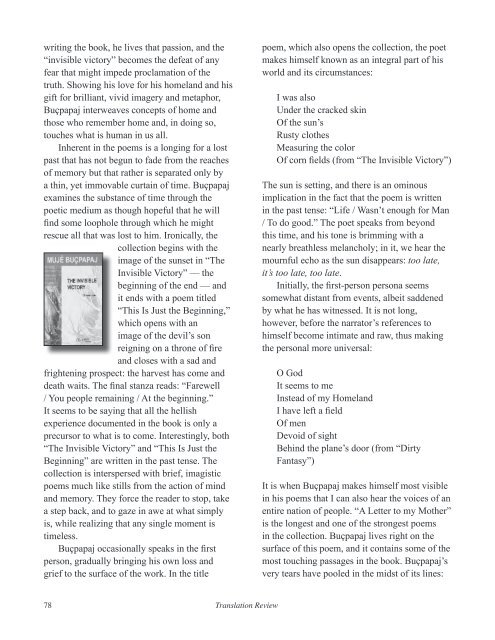Table of contents - The University of Texas at Dallas
Table of contents - The University of Texas at Dallas
Table of contents - The University of Texas at Dallas
Create successful ePaper yourself
Turn your PDF publications into a flip-book with our unique Google optimized e-Paper software.
writing the book, he lives th<strong>at</strong> passion, and the<br />
“invisible victory” becomes the defe<strong>at</strong> <strong>of</strong> any<br />
fear th<strong>at</strong> might impede proclam<strong>at</strong>ion <strong>of</strong> the<br />
truth. Showing his love for his homeland and his<br />
gift for brilliant, vivid imagery and metaphor,<br />
Buçpapaj interweaves concepts <strong>of</strong> home and<br />
those who remember home and, in doing so,<br />
touches wh<strong>at</strong> is human in us all.<br />
Inherent in the poems is a longing for a lost<br />
past th<strong>at</strong> has not begun to fade from the reaches<br />
<strong>of</strong> memory but th<strong>at</strong> r<strong>at</strong>her is separ<strong>at</strong>ed only by<br />
a thin, yet immovable curtain <strong>of</strong> time. Buçpapaj<br />
examines the substance <strong>of</strong> time through the<br />
poetic medium as though hopeful th<strong>at</strong> he will<br />
find some loophole through which he might<br />
rescue all th<strong>at</strong> was lost to him. Ironically, the<br />
collection begins with the<br />
image <strong>of</strong> the sunset in “<strong>The</strong><br />
Invisible Victory” — the<br />
beginning <strong>of</strong> the end — and<br />
it ends with a poem titled<br />
“This Is Just the Beginning,”<br />
which opens with an<br />
image <strong>of</strong> the devil’s son<br />
reigning on a throne <strong>of</strong> fire<br />
and closes with a sad and<br />
frightening prospect: the harvest has come and<br />
de<strong>at</strong>h waits. <strong>The</strong> final stanza reads: “Farewell<br />
/ You people remaining / At the beginning.”<br />
It seems to be saying th<strong>at</strong> all the hellish<br />
experience documented in the book is only a<br />
precursor to wh<strong>at</strong> is to come. Interestingly, both<br />
“<strong>The</strong> Invisible Victory” and “This Is Just the<br />
Beginning” are written in the past tense. <strong>The</strong><br />
collection is interspersed with brief, imagistic<br />
poems much like stills from the action <strong>of</strong> mind<br />
and memory. <strong>The</strong>y force the reader to stop, take<br />
a step back, and to gaze in awe <strong>at</strong> wh<strong>at</strong> simply<br />
is, while realizing th<strong>at</strong> any single moment is<br />
timeless.<br />
Buçpapaj occasionally speaks in the first<br />
person, gradually bringing his own loss and<br />
grief to the surface <strong>of</strong> the work. In the title<br />
poem, which also opens the collection, the poet<br />
makes himself known as an integral part <strong>of</strong> his<br />
world and its circumstances:<br />
I was also<br />
Under the cracked skin<br />
Of the sun’s<br />
Rusty clothes<br />
Measuring the color<br />
Of corn fields (from “<strong>The</strong> Invisible Victory”)<br />
<strong>The</strong> sun is setting, and there is an ominous<br />
implic<strong>at</strong>ion in the fact th<strong>at</strong> the poem is written<br />
in the past tense: “Life / Wasn’t enough for Man<br />
/ To do good.” <strong>The</strong> poet speaks from beyond<br />
this time, and his tone is brimming with a<br />
nearly bre<strong>at</strong>hless melancholy; in it, we hear the<br />
mournful echo as the sun disappears: too l<strong>at</strong>e,<br />
it’s too l<strong>at</strong>e, too l<strong>at</strong>e.<br />
Initially, the first-person persona seems<br />
somewh<strong>at</strong> distant from events, albeit saddened<br />
by wh<strong>at</strong> he has witnessed. It is not long,<br />
however, before the narr<strong>at</strong>or’s references to<br />
himself become intim<strong>at</strong>e and raw, thus making<br />
the personal more universal:<br />
O God<br />
It seems to me<br />
Instead <strong>of</strong> my Homeland<br />
I have left a field<br />
Of men<br />
Devoid <strong>of</strong> sight<br />
Behind the plane’s door (from “Dirty<br />
Fantasy”)<br />
It is when Buçpapaj makes himself most visible<br />
in his poems th<strong>at</strong> I can also hear the voices <strong>of</strong> an<br />
entire n<strong>at</strong>ion <strong>of</strong> people. “A Letter to my Mother”<br />
is the longest and one <strong>of</strong> the strongest poems<br />
in the collection. Buçpapaj lives right on the<br />
surface <strong>of</strong> this poem, and it contains some <strong>of</strong> the<br />
most touching passages in the book. Buçpapaj’s<br />
very tears have pooled in the midst <strong>of</strong> its lines:<br />
78 Transl<strong>at</strong>ion Review

















